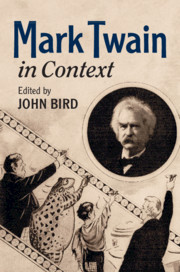Book contents
- Mark Twain in Context
- Mark Twain in Context
- Copyright page
- Contents
- Figures
- Contributors
- Preface
- Acknowledgments
- Chronology
- Abbreviations
- Part I Life
- Part II Literary Contexts
- Part III Historical and Cultural Contexts
- Chapter 15 Politics
- Chapter 16 Business and Economics
- Chapter 17 Religion
- Chapter 18 Science and Technology
- Chapter 19 Race and Ethnicity
- Chapter 20 Race and Ethnicity
- Chapter 21 Race and Ethnicity
- Chapter 22 Cosmopolitanism
- Chapter 23 Gender Issues
- Chapter 24 Gender Issues
- Chapter 25 History
- Chapter 26 Animals and Animal Rights
- Chapter 27 Nationalism and Anti-Imperialism
- Chapter 28 Philosophy
- Part IV Reception and Criticism
- Part V Historical, Creative, and Cultural Legacies
- Further Reading
- Index
- References
Chapter 21 - Race and Ethnicity
Chinese
from Part III - Historical and Cultural Contexts
Published online by Cambridge University Press: 12 December 2019
- Mark Twain in Context
- Mark Twain in Context
- Copyright page
- Contents
- Figures
- Contributors
- Preface
- Acknowledgments
- Chronology
- Abbreviations
- Part I Life
- Part II Literary Contexts
- Part III Historical and Cultural Contexts
- Chapter 15 Politics
- Chapter 16 Business and Economics
- Chapter 17 Religion
- Chapter 18 Science and Technology
- Chapter 19 Race and Ethnicity
- Chapter 20 Race and Ethnicity
- Chapter 21 Race and Ethnicity
- Chapter 22 Cosmopolitanism
- Chapter 23 Gender Issues
- Chapter 24 Gender Issues
- Chapter 25 History
- Chapter 26 Animals and Animal Rights
- Chapter 27 Nationalism and Anti-Imperialism
- Chapter 28 Philosophy
- Part IV Reception and Criticism
- Part V Historical, Creative, and Cultural Legacies
- Further Reading
- Index
- References
Summary
Mark Twain had a positive and supportive stance toward the Chinese from his time in the West and throughout his lifetime. He recognized the ill treatment of Chinese immigrants in Nevada and California, and he spoke out against brutal police tactics against Chinese in San Francisco. He collaborated with Bret Harte on a play, Ah Sin, which employs Chinese stereotypes, but also makes a pro-Chinese statement. As efforts toward Chinese exclusion intensified in the 1870s and 1880s, he was a strong supporter of Chinese rights. Although he never traveled to China during his lifetime, he is considered by the Chinese as a friend of their people and their country.
- Type
- Chapter
- Information
- Mark Twain in Context , pp. 213 - 223Publisher: Cambridge University PressPrint publication year: 2020

